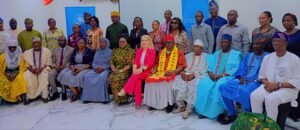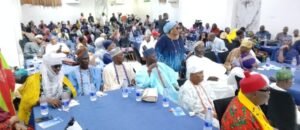The United Nations Children’s Fund (UNICEF) says it will partner with the Lagos State Government (LASG) to ensure that every child’s right is identified through universal birth registration.
Celine Lafoucriere, Chief of UNICEF Lagos Field Office, said this at the Lagos State Multi-Sectoral Stakeholders’ Dialogue on Birth Registration held in the state.
Lafoucriere described registration at birth as the foundation of a child’s protection and access to essential services.
According to her, birth registration is the first line of protection for every child. Without it, children cannot access healthcare, education, or social services. Without it, they are invisible.

She commended the state government for leading Nigeria’s campaign, with 94 per cent of children U-5 already registered.
She disclosed that in September the National Population Commission (NPC), with UNICEF’s support, distributed over 16 million birth certificates nationwide, with Lagos receiving more than six million, been the highest allocation in the country.
”This is one of the highest coverage rates in the country.
”This shows both the scale of what Lagos has accomplished and the trust placed in your systems. Nevertheless, we are targeting 545,000 newborns in 2025,” she said.
She noted that in spite of the progress, hard-to-reach communities, informal settlements, and low-income families still face barriers, adding that UNICEF’s goal was to ensure no child is left behind.
She explained that UNICEF was now focusing on children under one year, as previous national registration drive had covered millions U-5.
”We have managed to register over 12 million children under-five years in the last three years. This year, we are concentrating on newborns because the goal is to reduce unregistered under-five,” she added.
Lafoucriere stressed that unregistered children remain invisible in national data, adding this affects planning, social protection, access to justice, and even inheritance or legal identity challenges later in life.
”When a child is unregistered, that child does not exist in the eyes of the law. They are excluded from social protection, planning, and opportunities that shape their future,” she explained.
She announced that all birth registration and health facility trainings across the 20 local government areas of the state have been completed, adding that tablets and other registration supplies had been distributed.
”The foundation is in place. I can safely say that Lagos is ready,” she added.
Speaking at the event, Mrs Olayinka Oladunjoye, Federal Commissioner, NPC Lagos, urged local councils, religious institutions, and community leaders to intensify awareness and mobilisation efforts to achieve total coverage.
According to her, without registration, there is no identity; and without identity, we can’t plan for them. Accurate data aids government decisions on schools, health centres, and infrastructure.
She re-emphasised that birth registration was the first legal acknowledgement of a child’s existence hence the importance of the stakeholders forum.
In her presentation, the UNICEF Social Behaviour Change Specialist, Lagos field office, Mrs Aderonke Akinola-Akinwole said there was the need to create more awareness and sensitise the people more
on the importance of birth registration.
Akinola-Akinwole, said lack of prioritisation, accessibility barriers, weak integration within routine services, weak policies and limited logistics as well as delivery points have remained a challenge in birth registration.
She said that the way forward was through strengthened community engagement, target campaign, building capacity of Frontline workers across sectors and prioritising birth registration into existing level feedback mechanism and reporting.
Earlier, Mr Dennis Onoise, Child Protection Specialist, UNICEF Lagos Office, in his presentation, said that Nigeria’s strategic acceleration plan outlined a transformative roadmap for an inclusive, digitalised, and responsive civil registration and vital statistics system.
Onoise explained that this meant aligning national priorities with regional and global frameworks for sustainable development.
He said that through participatory governance, digital innovation, and strategic investments, the plan sort to strengthen data systems and ensure every life was counted and every right protected.
According to him, collective action from government, partners, and communities is vital to mobilise resources, build capacity, generate demand, and integrate services for a resilient system.
Similarly, Mrs Olajumoke Otitoloju, Welfare Officer, Child Protection Network (CPN), identified poor awareness and unofficial charges as barriers that still discourage parents from registering their children.
”Birth registration is the first legal identity of a child’s existence in the community. When a child is not registered, that child is invisible,” she said.
Otitoloju sued for stronger collaboration among ministries, health workers, and civil society, recommending the establishment of birth registration desks in primary schools and faith-based institutions to boost compliance.
”The media, traditional rulers, and community leaders must join hands to make birth registration a civic duty. It’s not just about naming a child it’s about giving them identity,” she emphasised.
The dialogue with the theme, ”Every child counts: Accelerating birth registration in Lagos State”, brought together stakeholders from health, education, youth, and social development sectors, alongside ALGON, traditional and religious leaders, and the media.

The participants resolved to develop a Lagos State Birth Registration Action Plan to strengthen awareness, integrate registration into healthcare and education systems, and ensure measurable progress by year-end.



